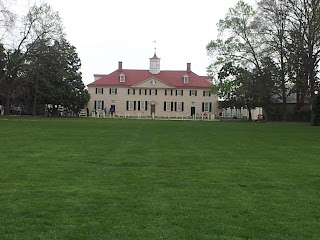Leadership vs. Power
 |
| (Mt. Vernon; photo credit: Pam McDonald) |
 |
| (George Washington statue at Mt. Vernon Visitor Center; photo credit: Pam McDonald) |
 |
| (Assembly Room in Independence Hall; photo credit: Pam McDonald) |
In 1787, Washington was coaxed back to Philadelphia to attend the Constitutional Convention. While there he provided the leadership necessary to get the fractious delegates to settle down and complete the work of designing a new constitution. Afterwards, in 1789, he was elected the first President of the United States. He reluctantly ran for a second term in 1792. He refused to run for a third term setting a precedent that lasted 150 years, and retired once again to his farm.
 |
| (Washington quote at the Mount Vernon Visitor Center; photo credit: Pam McDonald) |
Washington died in 1799, the year that Napoleon Bonaparte became the ruler of France. In contrast to Washington, Napoleon could not acquire enough power. His legendary lust for command drove him to take over much of Europe. “Power is my mistress,” he once claimed, “I have worked too hard at her conquest to allow anyone to take her away from me.”
Years later, having lost all power and living in exile, he lamented "They wanted me to be another Washington."
History is rife with stories of people who abused their power. Abuse of power, however, is not just reserved for politicians and tyrants. It can be abused by managers, spouses, parents, peers and the list goes on. It is the lure of dominance over others, when it motivates people toward leadership roles, that is revealing. It reveals uncertainty, lack of confidence and fear. It is said that power corrupts, but more often than not, it is a corrupted individual who is attracted to power. It is a feeling of inferiority, sometimes called a Napoleon Complex, that drives someone to control other people and to micro-manage their surroundings. Today we call such a person a Control Freak. Science fiction author, Robert Heinlein noted, “Anyone who wants to be a politician shouldn’t be allowed to be one.”
When we look at Abraham Maslow’s hierarchy of Human Motivation (Survival, Safety, Social, Esteem, Fulfillment), we see that someone who hungers for power is stuck in the second to bottom level which is Safety. A true leader has self-esteem and self confidence and does not seek power to bolster his or her feeling of self worth. Thomas Jefferson observed that, “An honest man can feel no pleasure in the exercise of power over his fellow citizens.”
A true leader is motivated by a goal. A goal common to his group whether that group is a company or a country. If you find yourself attracted to leadership, stop and check your motivation. Are you driven to share your gift of understanding in the endeavor of achieving a goal, or are you motivated by perquisites of position and the power you have over others? As John Quincy Adams said, “If your actions inspire others to dream more, learn more, do more and become more, you are a leader.”
Robert Evans Wilson, Jr. is a motivational speaker and humorist. He works with companies that want to be more competitive and with people who want to think like innovators. For more information on Robert's programs please visit www.jumpstartyourmeeting.com.
----------- Publishing Information ----------
This article is offered free of charge on a nonexclusive basis. The copyright is retained by Robert Evans Wilson, Jr. You may reprint or post this material, as long as my name (Robert Evans Wilson, Jr.) and contact information (www.jumpstartyourmeeting.com) are included. If you publish it, please send a copy to Jumpstart Your Meeting! PO Box 190146, Atlanta, GA 31119. If you post it, please send the URL to robert@jumpstartyourmeeting.com.
Jeff Surber, Humboldt-Toiyabe NF
Originally posted in 2009
1 comment:
Very nice article. Excellent short and concise analysis of the individual and how the authority and power of leadership can be used for good or evil. Washington would be in the top 10 of all leaders who have ever walked the face of the earth in recorded history.
Post a Comment